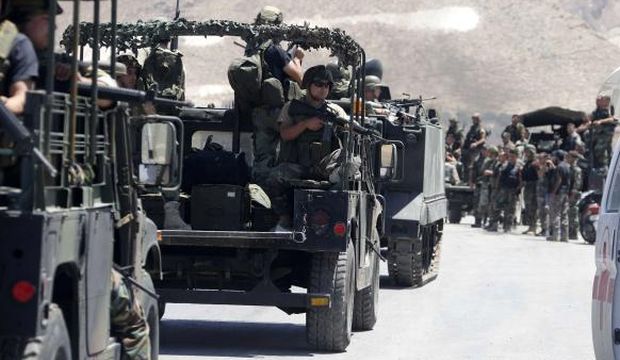
Lebanese army soldiers on military vehicles and armored carriers advance towards the Sunni Muslim border town of Arsal in the eastern Beqaa Valley in Lebanon on August 4, 2014. (Reuters/Mohamed Azakir)
Labweh, AP—Thousands of Lebanese civilians and Syrian refugees crammed into cars and pickup trucks on Monday to flee from a border town overrun by militants from neighboring Syria, as more Lebanese soldiers died battling to expel them.
The exodus came as an army statement claimed progress in the campaign and said the Syrian militants who captured the eastern town of Arsal had killed “a number of residents who refused to obey [their] orders.” The army also sent reinforcements to the area.
The clashes are the most serious spillover of violence from the Syrian war into Lebanon to date, compounding fears that the tiny country is fast becoming a new front in its neighbor’s conflict, now in its third year.
The three-day fighting in Arsal, a predominantly Sunni town surrounded by Shi’a villages, could worsen already-brewing sectarian tensions in Lebanon. The army has vowed to expel the militants from the town—an ambitious task considering the porous nature of the Syria–Lebanon border and the political and sectarian divisions within Lebanon.
So far, at least 11 Lebanese troops have been killed and 13 soldiers are missing in the clashes, which erupted on Saturday after Syrian militants made a cross-border raid and overran army positions in the area.
Monday’s army statement reported “a number of martyrs,” while a Lebanese security official, speaking on condition of anonymity, said the number of soldiers killed had risen to 16.
Residents fleeing Arsal said they made use of a relative lull between midnight and Monday morning to pack up and leave. Heavy fighting then erupted, and black smoke could be seen billowing over the town, which the Lebanese army has sealed off.
Heavy gunfire and the thud of shells could be heard from a distance as tanks pounded rebel positions in and around Arsal. A dozen Lebanese army flatbed trucks were seen carrying tanks towards the outskirts of the town on Monday.
Among those fleeing was Aziza Rayed, in her 60s, who said her family was going to the nearby border town of Qaa.
“We are leaving to take these children to a safer place,” she said, as her children and grandchildren sat in the back of a pickup truck.
Syrian refugees who had earlier fled the war at home for Arsal were among those fleeing on Monday. One of them, Fatmeh Meshref from the Syrian central city of Homs, said she and her husband and five children were terrified.
“Our children were screaming and we had no place to hide,” she said.
Lebanon’s state-run National News Agency (NNA) said three children from the Hojeiri family were killed in Monday’s clashes. It also reported looting of homes and shops in Arsal by gunmen.
The Syrian incursion and capture of Arsal came after the Lebanese army said its troops had detained Syrian Imad Ahmed Juma’a, who identified himself as being a member of the Al-Qaeda-linked Al-Nusra Front—one of the most powerful rebel groups fighting against Syrian President Bashar Al-Assad’s troops.
The NNA reported on Saturday that Juma’a was detained as he was being brought to a hospital in Lebanon after being wounded while fighting Syrian troops.
Lebanese army chief Gen. Jean Kahwaji said on Sunday the Syrian fighters in Arsal belonged to extremist Sunni groups, which he didn’t name. He said the fighting was “more serious than what some people imagine” and called on Lebanese politicians to show unequivocal support for the military.
